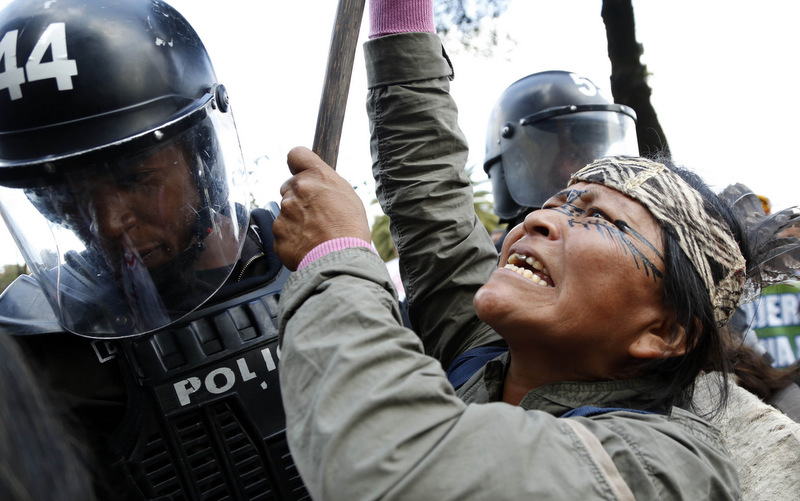Typically, due to a lack of direct representation and a diminished voting base, indigenous groups worldwide are subject to exploitation and a corruption of their rights.

By Frederick Reese, Mint Press News
Ecuador’s broken promise to not drill for oil in the territory of several of the nation’s indigenous people has touched off a tribal war and nearly universal condemnation from the international community.
Ecuador, a member of the Organization of Petroleum Exporting Countries, finds itself forced to find new oil sources to satisfy the nation’s ballooning debt to China. The government’s drilling in Yasuni National Park, one of the world’s most ecologically fragile, has been called inexcusable and reckless by locals for the damage it is causing.
Yasuni National Park is home to many species of flora and fauna that exist nowhere else in the world and to several indigenous tribes that have had no contact to the outside world.
A generation ago, the Waorani (also known as the Huaorani, the Waos or the Waodani) — a culturally-isolated indigenous group, started to find its territory challenged by illegal logging. The situation was made worse by American missionaries who worked to moved the Waorani away from its hunting and gathering traditional existence in the rainforest to permanent villages, such as Yawepare, where the Waorani is forced to live in makeshift shacks with no running water or electricity.
This missionary intervention, coordinated by the Ecuadorian government — cleared large blocks of land around the Auca Road for oil extraction. This has led to major contamination of the drilling sites, due to oil and chemical spills under Texaco management. Chevron, which acquired Texaco, was sued by the Yasuni tribes and was ordered to pay $18 billion in 2011 in restitution. Chevron has rejected the judgment and, as Chevron has no active assets in Ecuador, cannot be forced to pay.
This has created a situation in which those who desperately wish to be left alone have grown dangerously even more desperate. The Taromenane, a voluntarily isolated group that violently resisted the missionaries’ attempt to “civilize” them have allegedly increased its attacks on neighboring tribes. While inter-tribal feuds have existed for generations, they have accelerated with the increased presence of outsiders on its tribal lands.
In one cited example, more than 20 Taromenane, mostly women and children, were killed by the Waorani after a Waorani elder and his wife were allegedly killed by the Taromenane. This happened under the supposed protection of the Ecuadorian government. Two Taromenane girls were kidnapped by the Waorani; Ecuadorian officials were only able to recover the eldest girl, with the youngest still in Waorani custody. According to the tribes involved, this is recognized as being in compliance with their traditional mode of justice.
“I protest because it is my home,” said Alicia Cahuiya, a Waorani leader who was invited to speak to the National Assembly after the Assembly voted to open drilling in the Yasuni National Forest.
After Ecuadorian President Rafael Correa won re-election in March, he proposed the opening of drilling in the Yasuni but offered to postpone to leave the oil in the ground if the international community donated the $3.6 billion his country would have lost in revenue. In August, Correa abandoned this plan when only $17 million was donated.
“Yes, there is oil there, but I do not agree with the oil exploitation. We should be consulted about Yasuní. Our elders do not agree with any of this,” Cahuiya said. “Why are the Taromenane tribe people being killed fighting the Huaorani? Because you opened a road into the jungle! We don’t want any of that! Let us live like Waoranis. That is what we want!”
Typically, due to a lack of direct representation and a diminished voting base, indigenous groups worldwide are subject to exploitation and a corruption of their rights. Due to this, many indigenous groups have been hit with rampant poverty, lack of essential services and denial of legal access and protection.
